Political Ideologies - Environmentalism | 11th Political Science : Chapter 8 : Political Ideologies - Part-II
Chapter: 11th Political Science : Chapter 8 : Political Ideologies - Part-II
Environmentalism
Environmentalism
The advent of modern science and technology driven development had
devastated the planet’s environment precipitating several ecological crises
like ozone depletion, climate change and acid rain. Environmentalism arose as a
protest movement and ideology against the perilous destruction of the earth. We
have only one habitable planet in the entire universe and there is no
alternative home and therefore protecting the environment assumes paramount
significance
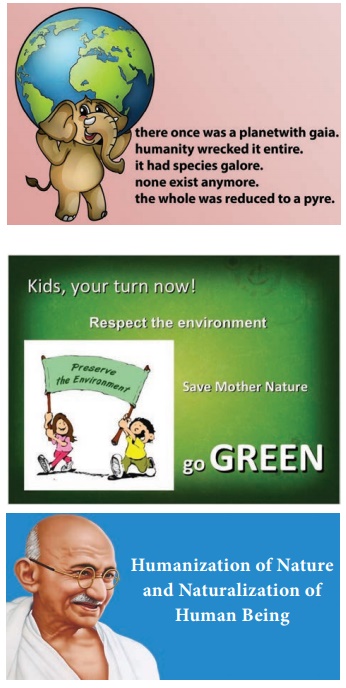
There exists a profound debate in philosophy about the relationship
between man and ecology, development and environment. The Deep Ecology versus
Shallow Ecology controversy is the central point of discussion in the debate.
Shallow Ecology
Shallow Ecology refers to an ideology that approaches ecology through an anthropocentric and utilitarian outlook. American philosopher Anthony Weston is the greatest supporter of shallow ecology. It considers the human beings as fulcrum of life in this world. It accords the position of centrality and supremacy to man in ecology. It adopts an instrumental value of nature meaning that the ecology is important only as it useful to human welfare. The non-human biological forms and inanimate world are nothing but natural resources for human life.
Anthropocentrism
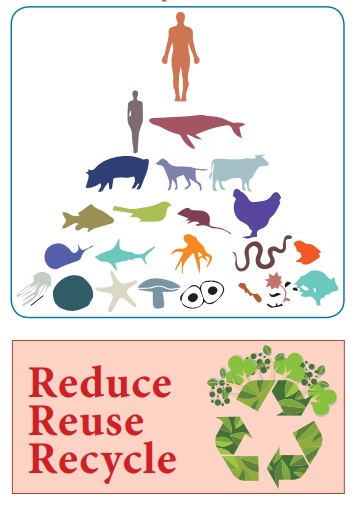
It looks for technological solutions for any environmental problem. If
pollution imperils environment then alternative energy sources that are
renewable and environment friendly should be developed. It believes in the
strategy of three R,s - reduce, reuse and recycle.
Deep Ecology
Norwegian ecological philosopher Arne Naess coined the term Deep Ecology
in 1973. He was influenced by Rachel Carson and Mahatma Gandhi. Deep ecology
theory argues that the planet Earth is constituted by three interlinked parts
of the human beings, non- human biological forms and the inanimate objects and
forces. The human beings are one among the millions of living organisms in this
world. They do not possess any superiority over other organisms.
Anthropocentrism, that is, the belief in the centrality and supremacy of human
beings in this world must be discarded.
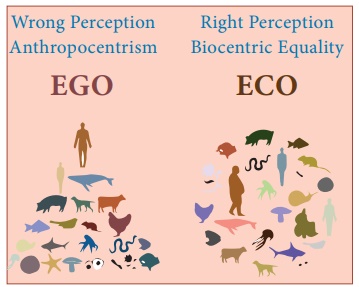
The non-human biological forms also possess intrinsic value, inherent
worth and identity. It believes in biocentric equality. The human beings need
to satisfy the vital needs by making careful use of this biodiversity.
Preservation of biodiversity is indispensable. The interference of human beings
on the domain of the non-human sphere of the planet so for, is destructive,
excessive and unacceptable. There is an urgent need to limit the population of
the world as the current population explosion has injected enormous stress on
the ecology.

We should change our technology, philosophy, economy and politics so
that ecological crises can be rectified and averted in the future. The human
beings are ‘ecological selves’ the materialistic and consumerist life style
must be changed and a new ecologically-sensitive social and economic order must
be created. We should reduce our ‘ecological footprint’ by adopting a meager
resources based life style. As the nomenclature indicated deep ecology asks
deeper questions of how and why examining philosophically the impact of human
life as one part of the ecosphere on other components.
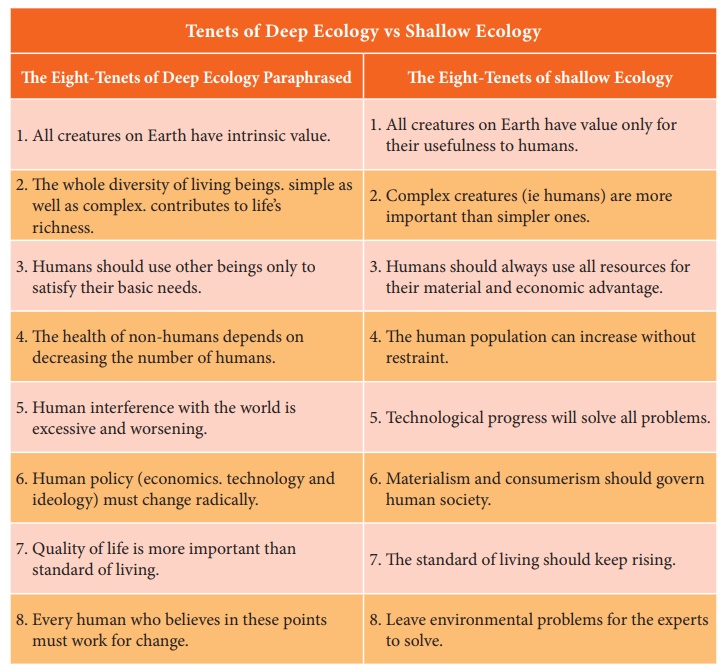
Political Theory and Ecology
The words environment and ecology are synonymous. Andrew Heywood, the
noted political scientist classifies ecology in political theory into three
kinds
v Social
Ecology
v Modernist
Ecology
v Deep
Ecology

A) Social Ecology
The term ‘Social Ecology’ was coined by American philosopher Murray
Bookchin. It advocates radical changes in the existing social and political
structures to make them ecologically correct. There are three distinct trends
in Social Ecology
1
Eco-socialism
2
Eco-anarchism
3
Eco-feminism
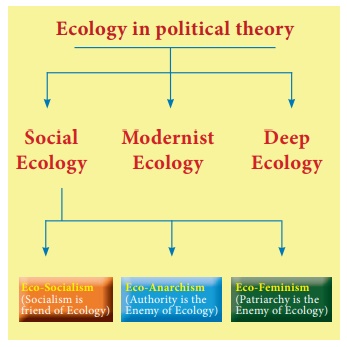
1. Eco-Socialism
Rudolph Bahro in his book ‘From Red to Green’
supported eco-socialism. It considers capitalism as the enemy of ecology. By
breeding materialism and consumerism capitalism has inflicted horrific
destruction on the environment. The unlimited right to private property, the
cardinal principle of capitalism endangers the precious health and wealth of
the planet’s ecology. The nature is seen only as a commodity to be traded in
the market and consumed by the man. Eco-socialism propounds a new approach in
politics that combines socialism and ecologism. Socialism alone can nurture
environment. The state must be imparted with a socialist content and direction
to end the evil of capitalism and to protect environment.
2. Eco-anarchism
Murray Bookchin advocated eco-anarchism. It considers authority as the
enemy of ecology. The emergence of authority in human history in the form of
State, religion and even family had led to the domination of man over man. The
same forces have produced the subjugation and domination of nature by man. Man
is a voluntary animal and his original instinct is the cooperative instinct.
In the ideal society, man establishes various
associations based on voluntary cooperation to achieve development. But
artificial forces of State, religion, private property have subverted the system
and created structures of domination and subjugation. They have also wrought
havoc on ecology. Therefore, we should create a new society based on voluntary
instincts to protect man and ecology
3. Eco-feminism
Carolyn Merchant in the book ‘The Death of Nature’
propounded eco-feminism. This perspective considers patriarchy as the enemy of
ecology and feminism as its beloved friend. Patriarchy means domination of man
over women. Eco-feminism argues that patriarchy created the domination of man
over not only women but over nature also. Patriarchy follows instrumental
reason whereby both women and ecology are seen merely in terms of use value, as
objects to be exploited and not as subjects endowed with life and intrinsic
worth. Eco- feminism demands gender and ecology sensitive politics so that a
new world of justice and sustainability can be established.
B) Modernist Ecology
Modernist ecology is synonymous with shallow
ecology. It attempts to promote a new harmony between liberalism and ecology.
The liberal tenets and approach should be reformed so that the menace of
ecological destruction can be avoided. It advocates a new ‘enlightened
anthropocentricism’ where man, being the centre of the planet must consider the
long-term interests of humanity and ecology in his developmental activities and
should not be driven solely by short-term interests. Modernist ecology believes
in the concept of "inter-generational justice" and argues that we did
not inherit the earth from our previous generations but borrowed it from the
future generations of humanity and therefore, there is a moral responsibility
to protect and preserve the earth for their life in the future. The concept of
‘sustainable development’ is a basic characteristic of modernist ecology. It
argues that ‘getting richer faster’ should not be the goal of human world
rather ‘getting richer slower’ should be its guiding approach.

The modernist ecology is not a homogenous ideology.
On the contrary, it is heterogeneous. There are different perspectives and
prescriptions. Certain followers have called for the establishment of a
totalitarian ‘Green State’ to protect ecology. Another group of supporters
demanded ‘Green Capitalism’. The majority of advocates and supporters of
modernist ecology suggested the green tilted State intervention in market to
protect ecology and satisfy human interests.
C) Deep Ecology
It advocates a new style of politics, policy and political attitude towards nature. It argues for a fundamental shift in the relationship between politics and nature. Politics must understand, respect and protect the element of inter connectedness found in ecology linking the human beings, other biological forms and the inanimate world.
Ecological Movements in India
The destruction of ecology through modern
development had resulted in the emergence of many protest movements all over
the world. India also has witnessed many ecological protest movements seeking
to protect environment and biodiversity. We shall study four such important
ecological movements of India
A
Bisnoi Movement
B
Chipko Movement
C
Appiko Movement
D
Save Silent Valley Movement
A. Bisnoi Movement
Bisnoi non-violent struggle was a successful
ecological movement in the 18th century in Rajasthan. Bisnoi is a religious
sect in the Thar desert of Rajasthan founded by Guru Jambeshwar in medieval
period. Bisnoi in Hindi means 29 and the sect came to be named after the 29
cardinal principles the founder expounded. The sect promoted a socio-religious
belief system in perfect harmony with ecology creating a lush green local
ecosystem in the desert.

The maharaja of Jodhpur desired to construct a
palace in the 18th century and sent the army to the Khejarli village to cut the
acacia trees in the locally nurtured forest. The ecologically- conscious local
population protested against the cutting of trees. An elderly woman named
Amrita Devi was in the frontline of the protest and when the army refused to
desist from cutting the trees she hugged the trees asking the army to cut her
head instead of cutting the trees. The army remorselessly cut her head off and
concerned but determined villagers came forward in a line to offer their lives.
A total of 363 people sacrificed their lives for protecting the forest.
Ultimately the maharaja after knowing about the terrible events in the village
recalled the army and offered his apologies for the massacre. He also
officially designated the area as a protected forest. Bisnoi Khejarli movement
is perhaps, the first greatest ecological movement of modern India.
B. Chipko Movement
Chipko movement was a non-violent popular,
ecological movement organised by villagers in the mountain state of Uttarkhand
in 1973. ‘Chipko’ in Hindi means to hug. The agitators of Chipko movement
embraced the trees to protect them from being cut thereby earning the name
Chipko movement. The contractors of sports goods company began to cut the trees
in the Alknanda valley of the Uttarkhand state (part of Utter Pradesh at that
time) after getting government clearance. The enraged local population,
especially women protested in a non-violent manner by embracing the trees and
prevented the contractors. The organisational leadership was provided by an NGO
called Dasholi Gram Swarajya Mandal (DGSM) that was formed a few years back by
a noted social activist Chandi Prasad Bhatt.
The famous environmentalist Sundarlal Bahuguna
joined the agitation and appealed to the union government to ban logging in the
Himalayan forests. The large-scale participation of women was a significant and
laudable feature of the Chipko movement. Many women leaders like Dhoom Singh
Negi, Bachni Devi played a prominent role fighting for forest rights of the
people. The movement gradually spread across many parts of the Himalayan
Mountains forcing the government to officially ban logging from 1980. The
movement symbolises the successful fusion of three major ideologies of
feminism, environmentalism and Gandhism

C. Appiko Movement
The Appiko movement is an ecological protest
movement in Uttar Kannada district of Karnataka in the Western Ghats. It was
inspired by the Chipko Movement and ‘appiko’ in Kannada means to embrace. The
Uttar Kannada district falls in the Western Ghats. The launch of many developmental
projects in the district has precipitated deforestation reducing the forest
cover of the district from a massive 81 percent in 1950 to an alarming 24
percent in 1980. The ecologically-conscious people launched the movement with
three-fold objectives of conservation of remaining tropical forests,
afforestation of the denuded forests and dissemination of ideas on rational
utilisation of forests.
D. Save Silent Valley Movement
The silent valley is an ecologically rich terrain in the Western Ghats
in the Palakkad district of Kerala consisting of the tropical moist evergreen
forests largely undisturbed by human activities. The valley is named after
Sairandhiri (Draupati), the wife of Pandavas in the Indian epic Mahabharata.
Another explanation of the nomenclature says that when the Englishmen visited
there during the colonial period the valley was observed to be strangely silent
because of the supposed absence of the noise-making insect Cicadas.
The valley is rich in biodiversity. The lion-tailed
macaque is abundantly found in the valley. There is even an argument that the
valley itself is named after the binomial name of lion- tailed macaque, Macaca
Silenus. The Kerala State Electricity Board began to implement Silent Valley
Hydro Electricity Project across the river Kunthipuzha in the valley in the
1970s.
The Kerala Sasthra Sahitya Parishad, other civil
society organisations and ecologically-conscious people conducted an intense
protest against the project. They criticised the negative impact of the project
on the environment especially the bio diversity of the valley. The Kerala
government, in the face of stiff opposition from diverse sections of society
dropped the project in 1980. The valley was declared a national park in 1985
and later on it came to be designated as the core area of the Nilgiris
Biosphere Reserve. The Save Silent Valley movement is one of the most
successful ecological movements of India in late 20th century.
Silent Valley and Lion Tailed Macaque

Related Topics